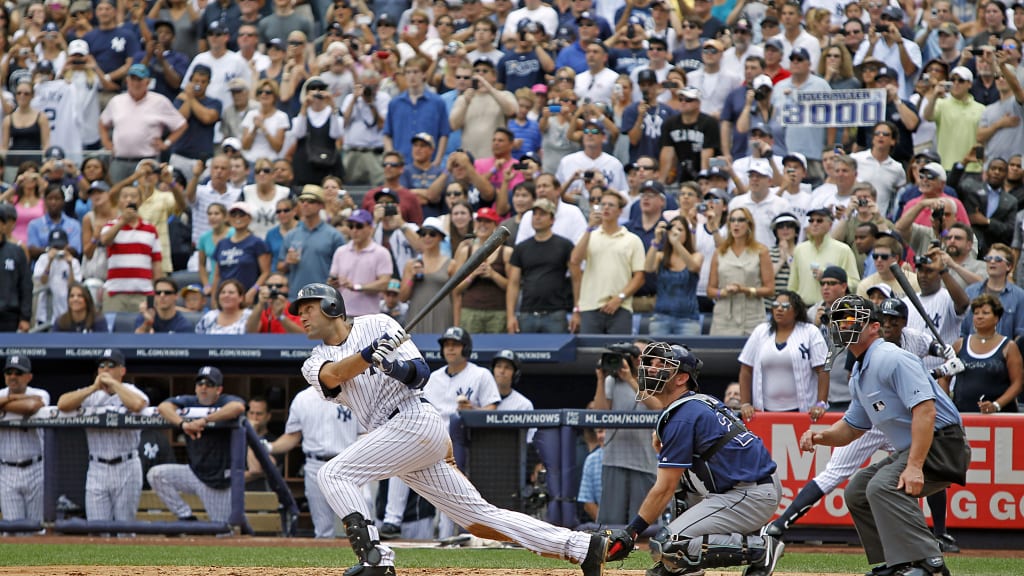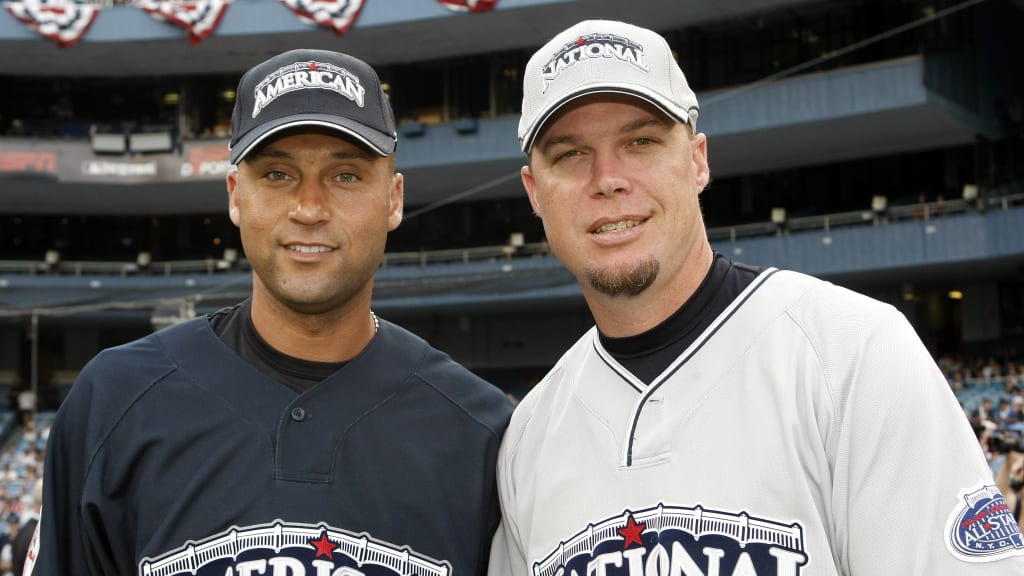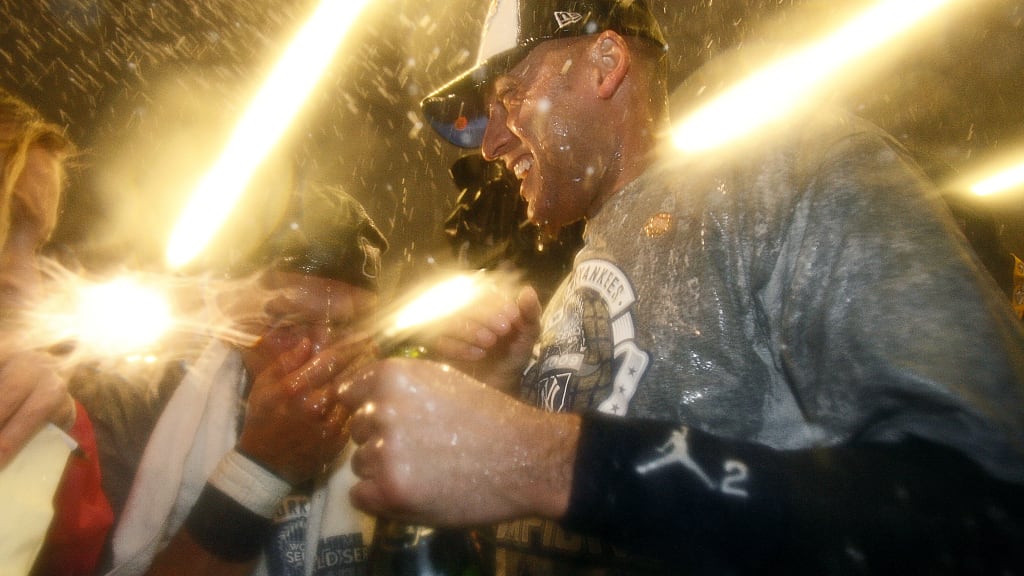
The Man Who Shot Liberty Valance graced movie theaters in 1962, the same year that saw the Yankees win a ninth championship in 14 seasons. Even if you’ve never seen the flick, perhaps you’ve heard at least some version of its most famous -- if oft-misquoted -- line:
“When the legend becomes fact, print the legend.”
It’s funny now to wrestle with that quote here, in a magazine conceived both to celebrate legends and to help create new ones. With baseball, you can watch the facts play out every night. What is longform magazine content, then, if not a writer’s attempt at contextualizing what you saw? Printing the legend, as it were?
But what if that instinct can inadvertently work against its own intentions? Is it possible that Derek Jeter’s legend is so vast, so overwhelming, that it inadvertently undermines his fantastic reality? Could Jeter’s playing accomplishments -- recently memorialized in, among other ways, a Hall of Fame plaque and a seven-part ESPN documentary -- be, in a way, underrated by not only his detractors but also his supporters?
“I think there are layers of the mythology -- and more so than just the mythology, the partisanship of the rivalry of the Yankees versus everyone else -- that obscure just how good a ballplayer he actually was,” says Jay Jaffe, the creator of the JAWS metric for Hall of Fame consideration and a senior writer at FanGraphs. “I get asked sometimes, ‘Would Derek Jeter be a first-ballot Hall of Famer on any other team?’ The guy had 3,465 hits. He was sixth all-time when he retired. That would be a Hall of Famer even on the Miami Marlins.”
It’s hard not to wonder: Somewhere along the line, did we mix up the facts and the legend?
***
On Sept. 9, before they take on the Rays, the Yankees will welcome their beloved captain and shortstop back to Yankee Stadium for Derek Jeter Hall of Fame Induction Tribute Night. Jeter, elected to the National Baseball Hall of Fame in January 2020 and finally feted in September 2021 after a COVID-induced delay, will throw out the ceremonial first pitch, and the first 40,000 guests in attendance will receive a replica Jeter Hall of Fame plaque.
It will be a grand night for Yankees fans, particularly those who came of age during The Captain’s rise. You can be sure, though, that a healthy portion of this constituency -- among them even the biggest fans -- will be heard downplaying Jeter’s feats, no matter their good intentions. Disagree? Just think about how many times you hear Jeter’s career boiled down to team success. It’s not about his numbers, you’ll hear, just that “he was a winner who knew how to thrive in New York without succumbing to New York.”
Well, no one is here to dispute Jeter’s epic knack for big moments, or his grace under pressure, or his Big Apple state of mind, or his five rings or seven World Series appearances. But here’s the thing: His numbers were that great. His plaque would grace Cooperstown even if he never assumed the Yankees’ captaincy, or never engaged with young fans while occupying the Stadium’s on-deck circle, or never hosted Saturday Night Live. That he did check all of those extra boxes simply smoothed the road he had already paved convincingly.
Hall of Famer Reggie Jackson was around the clubhouse constantly during Jeter’s career, and he saw it all firsthand. “You could walk by his locker for the first 10 to 12 years and you could see, on the easel, what he was working on, the body of work he had going for him,” Mr. October says of Mr. November. “I really think it took 10 to 12 years, and then I could look at the easel and see the Rembrandt.”
Or, as Major League Baseball’s official historian John Thorn says, “Longevity is much to be admired. There’s no arguing with 3,000-plus hits, regardless of which position he played.”
No one else who played only in the infield, let alone only at shortstop (with a handful of games as designated hitter), put together more hits; Hit King Pete Rose logged 1,327 shifts in the outfield on top of his 2,201 as an infielder. Which brings to mind a Reggie story about Jeter, the two men having grown close thanks to Jackson’s work as a Yankees adviser throughout Jeter’s playing career.
“In year 15 or 16, Derek was on the training table,” Jackson recalls, taking us to right around 2009, Jeter’s final championship. “He said, ‘Reggie, how many times did Pete Rose get 200 hits?’
“At the time, I realized: ‘This (guy) is thinking about 4,000 hits!’”
Jeter’s 212 hits in 2009, his age-35 season, gave him 2,747. It was the seventh time he passed the 200 mark, and it helped him finish third in the American League Most Valuable Player voting. Even accounting for age regression -- a delayed age regression, to be clear -- 4,000 hits, and Rose’s record of 4,256, seemed glancingly possible, if ambitious.
Rose, for the record, tallied 10 seasons of 200-plus hits, a big-league record shared by Jeter’s one-time Yankees teammate Ichiro Suzuki. Jeter wound up with eight, leading the AL with 216 knocks at age 38 in 2012, only for that campaign to crash and burn when he fractured his left ankle in Game 1 of the AL Championship Series, a devastating turning point for his late-stage career. That serious injury sabotaged his 2013, limiting him to 17 games, and factored into his February 2014 declaration that he wouldn’t play beyond that coming campaign -- which ultimately set the stage for his final legendary highlight, the walk-off single to beat the Orioles in his final plate appearance at Yankee Stadium.
***

Jeter’s 17-year run from 1996 -- his first full big-league season -- through 2012 stands out for both its excellence and consistency. Only once, in 2010, did Jeter put up below average offensive numbers, as per the metric OPS+. Only twice, in 2003 and 2011, did he play in fewer than 149 games, and the latter season featured a revival headlined by his 3,000th career hit, a homer off the Rays’ David Price in the Bronx.
Not surprisingly, Jeter’s hit count topped any player during the span of his career. Jeter’s Yankees teammate Alex Rodriguez finished second over those years with 2,928 hits, more than 500 behind.
“When you produce at a high level at the top of the lineup, it makes everyone’s job that much easier,” says Wade Boggs, Jeter’s fellow Hall of Famer and Yankees teammate from 1995 through 1997, as well as a guy who knows more than a little about consistent excellence from the top of the lineup. “Solidifying such an important position for so long, Derek had incredible value.
“They knew he was going to post every day. He didn’t come out of games and have little stints on the (injured list). He played every day, and he played every day hard.”
That goes for running the bases, as well. Jeter’s 358 stolen bases give him the franchise record, and his 78.7% success rate places him eighth overall in Yankees history (min. 50 steals). As per Jaffe, Jeter compiled 63 runs above average with his baserunning, which includes avoiding double plays.
When you press the well-meaning Yankees fans who play up Jeter’s intangibles at the expense of his tangibles, you’ll often hear the response that Jeter didn’t match the power numbers of A-Rod and Nomar Garciaparra, his contemporaries at shortstop and on magazine covers. Guilty as charged, on some counts, at least. Rodriguez finished with a remarkable 696 home runs. But Jeter, whose own offensive prowess never carried with it any sniff of scandal, wound up outhomering Garciaparra, 260 to 229, as the latter struggled to stay on the field (and at shortstop) due to injuries. Nomar, who debuted 460 days after Jeter’s first game, retired following the 2009 season, having stuck around just long enough to see the Yankees capture their 27th championship, and Jeter his fifth.
Jeter’s contributions weren’t limited to the offensive register in ’09. He also enjoyed a defensive revival, as he spent the previous winter, at the Yankees’ urging, working to improve his range. So now seems like a good time to discuss Jeter’s defense, a topic contentious and universal enough that Larry David’s fictional self even debated an argumentative stonemason about it on an episode of Curb Your Enthusiasm.
As a big-league shortstop, Jeter exhibited trustworthy hands, all the more impressive in light of his 56-error season for Class A Greensboro in 1993. Only twice did he exceed 20 errors at the Major League level. His memorable jump throws showed off his strong arm and became a defining image of the most recent Yankees dynasty.
You know all of the big defensive moments that Jeterologists include among his all-time moments: The Flip Play. The Dive Into The Stands. The Relay To Nail Timo Pérez. And so on.
Yet as he entered his 30s, baseball was introducing analytic measures such as Ultimate Zone Rating and Defensive Runs Saved to the masses. Jeter’s range became more of an issue, one that he addressed in ’09, then struggled to maintain in his final years, a common development among older players.
Statistically, range and hands can and should be regarded as equal assets. Realistically, though? “You’re not going to look as bad missing out on a ball as having it clank off your glove,” Jaffe points out, a common-sense notion that surely helped Jeter land some of his Gold Glove Awards. On an emotional level, few would dispute that, while failing to reach a ball hurts a team, reaching it, only to then botch the play, can be uniquely deflating.
Tilting back from the emotional to the intellectual, all players do some things better than they do others. The key is for the balance to work favorably. It worked quite favorably for Jeter and the Yankees.
“Any time you’re getting that sort of offense from a shortstop,” Jaffe says, “you’re winning.”
***

The Yankees won more than anyone else during Jeter’s run, and yes, we’ve saved the best for last: October.
Jeter’s postseason work elevated his resume from platinum-level to historically unique. His statistics tell a great story: He slashed .308/.374/.465 in 158 playoff games, a more-than-reasonable facsimile of the .310/.377/.440 he posted in 2,747 regular-season contests, only against better teams on average and more successful pitchers. With the obvious caveat that the playoffs have grown in scope throughout the game’s history, Jeter holds the all-time postseason marks for games played, plate appearances (734), runs scored (111), hits (200), total bases (302) and doubles (32). He ranks among the top 10 in virtually every other offensive category.
Unsurprisingly, he peaked in the most high-profile series of his career, the 2000 Subway World Series victory over the Mets, when he won MVP honors, delivering huge plays offensively (his leadoff homer in Game 4) and defensively (nailing Pérez at home in Game 1) in a series that played much closer than its 4-games-to-1 final tally.
“I think there’s certain people that were put on this planet where, the brighter the lights are, the more they shine,” says Braves great Chipper Jones, Jeter’s contemporary and fellow Hall of Famer. “I’ve seen it with a few people through the years. A lot of people would say that Smoltzie (John Smoltz) was better in the postseason than the regular season. Andy Pettitte was phenomenal in the postseason. Madison Bumgarner. You certainly have to throw Derek on that list.
“Getting a lot of opportunities helps. Both our organizations had plenty of opportunities to shine in the postseason. But man, it always seemed like DJ was in the right place at the right time.”
Jones, whose Braves lost to the Yankees in both the 1996 and 1999 Fall Classics, is no postseason slouch himself. He slashed a terrific .287/.409/.456 in 93 postseason contests, a nice complement to his .303/.401/.529 in the regular season.
“I’d been planning for those at-bats my whole life, since I was 6 or 7 years old in my backyard,” Jones says. “Three and two, two outs, bottom of the ninth, here we go. Not once did I make an out in my backyard. You have to go through those scenarios thousands of times so when you actually get there, you’re not overwhelmed by the situation. I think Derek would tell you that’s where we feel most comfortable.
“No offense to my teammates or Derek’s teammates, but there is nobody that we would rather have at the plate than ourselves.”
Jaffe devised JAWS (the Jaffe WAR Scoring System) as a method to determine a player’s Hall of Fame worthiness, a topic he studies seriously enough that he wrote a whole book (The Cooperstown Casebook) on the subject. Jeter scored a 57.4 JAWS, 2.4 above the average inducted shortstop at the time of the 2020 election. And that’s without factoring in his postseason heroics.
Of the 397 voters on the Baseball Writers Association of America’s 2020 Hall ballot, only one, whose identity remains publicly unknown, declined to vote for Jeter, meaning he fell just short of matching the 2019 perfection put up by his fellow Core Four member Mariano Rivera. Quite likely, some of those voters put an emphasis on Jeter’s countless memorable big moments. Or his clean reputation. Or the great work performed by his Turn 2 Foundation. Or even his fame.
“We always referred to Derek as the fifth Beatle,” Boggs says. “John, Paul, George and Ringo could walk out, and then Derek could follow.”
All of those attributes enhanced Jeter’s profile, and they were good for both his legacy, and for the sport of baseball, which has been trying to find the next Jeter-like transcendent figure since he retired at the end of 2014.
None of those benefits would have surfaced, though, if Jeter hadn’t put in the work to make himself the Yankees’ everyday shortstop. All of those inside-out swings, easily handled grounders and bursts from first to third laid the foundation that allowed the legend to emerge.
And that’s a fact.
